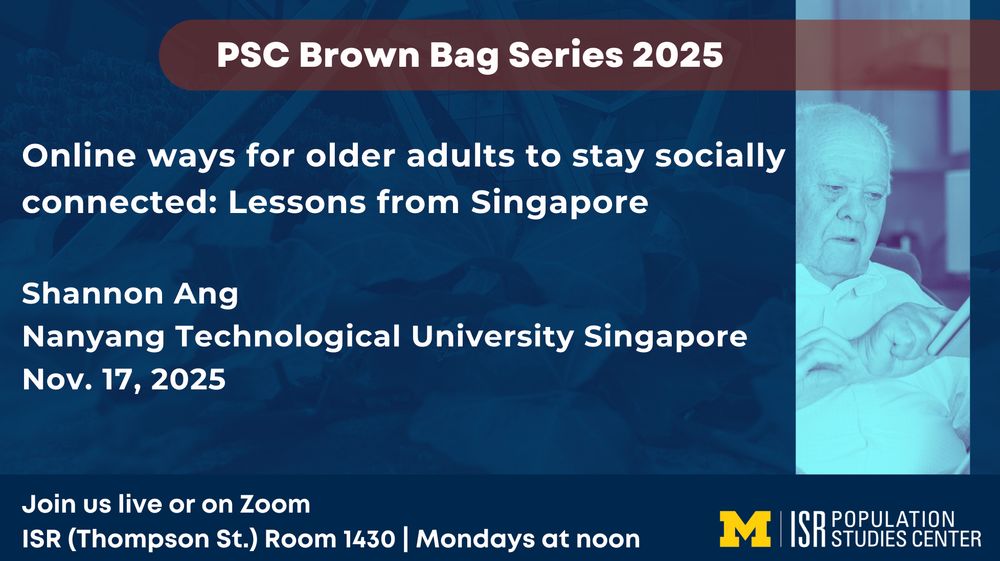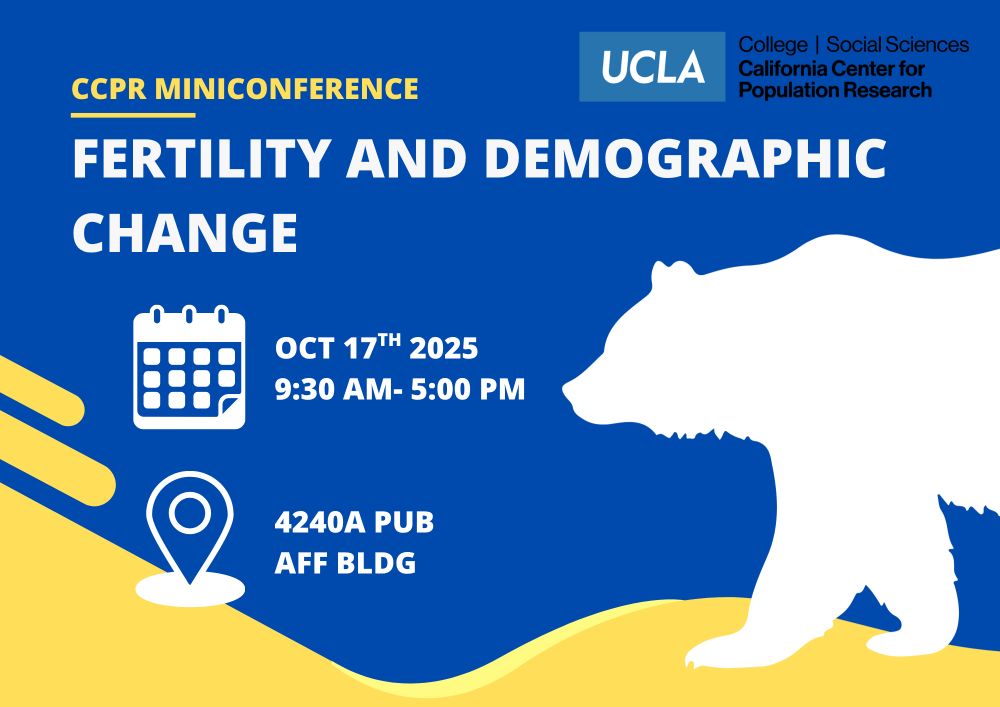
As "conflict-related mortality is on the rise and displacement has surpassed levels not seen since World War II", a timely editorial on Demography and War: link.springer.com/article/10.1...
12.02.2026 16:32 — 👍 7 🔁 2 💬 0 📌 0@patrickhvl.bsky.social
California Center for Population Research (CCPR) at UCLA Mekong Integrated Population-Registration Areas of Cambodia (MIPRAoC) Demography, Measuring and Modeling Demographic Processes (aka Preston et al., 2000, Wiley)

As "conflict-related mortality is on the rise and displacement has surpassed levels not seen since World War II", a timely editorial on Demography and War: link.springer.com/article/10.1...
12.02.2026 16:32 — 👍 7 🔁 2 💬 0 📌 0Our call for papers is out! Submit until May 15 2026.
05.12.2025 13:29 — 👍 4 🔁 4 💬 0 📌 0Call for Abstracts: Workshop on Determinants of Adult Mortality, Morbidity, and Healthy Aging in LMICs. Sponsors: UC Berkeley Center on Economics and Demography of Aging & USC/UCLA Center on Biodemography and Population Health
Deadline: Dec 15 2025
populationsciences.berkeley.edu/conferences/...

Study finds fertility response to extreme weather events diff b/w nuclear and joint family structures in Bangladesh & authors conclude "family structure represents an important but underexplored variable in understanding climate-fertility associations in vulnerable regions"
doi.org/10.1080/1948...

What can we learn about disaster impacts from case studies that often lack elements of a "gold standard" natural experimental research design? Review by Elizabeth Fussell, Kate Burrows & @narayansastry.bsky.social
wires.onlinelibrary.wiley.com/doi/full/10....
I’m recruiting a postdoctoral associate at NYU Abu Dhabi. Position is for 3 years with excellent salary, housing and benefits. Please share widely. For more information and application, link ⬇️
apply.interfolio.com/177935

In new study on domestic violence in Vietnam, Hanbo Wu argues "normalization of and desensitization to violence in the domestic sphere as well as war trauma likely play an important role in explaining the effect of conflict exposure on the justification of IPV" doi.org/10.1007/s001...
17.11.2025 19:52 — 👍 2 🔁 1 💬 0 📌 0
The Dorothy S. Thomas Award is presented annually for the best graduate student paper on the interrelationships among social, economic and demographic variables. Nominations now open! Submit a nomination by January 31, 2026. buff.ly/sMThJ6E
13.11.2025 14:17 — 👍 7 🔁 4 💬 0 📌 1IMHO too little attention to mortality-fertility interactions in highly-specialized demography (was once asked "Are you a mortality demographer or a fertility demographer?"), so really enjoyed article on extrinsic mortality & life history traits w/ 30 (!) peer commentaries :
doi.org/10.1017/S014...

Online ways for older adults to stay socially connected: Lessons from Singapore Shannon Ang Nanyang Technological University Singapore Nov. 17, 2025 PSC Brown Bag Series 2025 Join us live or on Zoom ISR (Thompson St.) Room 1430 | Mondays at noon
👀 We are thrilled to have @um-psc.bsky.social alumnus @angabridged.bsky.social join us for our next Brown Bag session: Shannon Ang of NTU Singapore joins us presenting on ways older adults stay socially connected online. #sociology Live and on Zoom: psc.isr.umich.edu/events/ang/
11.11.2025 15:48 — 👍 5 🔁 2 💬 0 📌 1
Curious about using census microdata in your research? 📊
Join us for a webinar on IPUMS International, the world’s leading repository of harmonized census data.
🗓️ 12 Nov 2025 | 🕒 15:15–16:30 UK | 💻 Zoom
Register: forms.gle/oqTDNU4Zpn2s...
Hosted by the LSE Historical Economic Demography Group.

The Brown Population Studies & Training Center is accepting applications to our Global Fellows Program. The program is for early- & mid-career demographers. We are especially interested in applications from scholars from low & middle-income countries. Share & apply! pstc.brown.edu/programs-and...
31.10.2025 12:44 — 👍 9 🔁 3 💬 0 📌 0
📢My paper is out in Population and Development Review.😀Central and Eastern Europe’s population change isn’t just about fertility, mortality, and migration — the age structure also an important factor.
#demography #ageing #fertility #Hungary #Poland #Romania #migration
doi.org/10.1111/padr...

CCPR Miniconference 10/17: “Fertility and Demographic Change” #CCPR #UCLA #CCPRWednesdays #UCLAEvent #CampusEvents #miniconference
15.10.2025 15:00 — 👍 2 🔁 2 💬 0 📌 0
job
TENURE-TRACK ASSISTANT PROFESSOR POSITION IN HEALTH AND THE LIFE COURSE OR WORK AND THE ECONOMY
Department of Sociology, Western University
csn-rec.ca/job-postings...
@westernu.ca #cdnsoci

Contemporary Pronatalism in Demographic Context Participating journal: Population Research and Policy Review Call for Papers Low and declining birth rates across the world have consequences for countries’ population size and structure. Concerns over the potential economic effects of population aging have spurred many countries to engage in efforts to raise birth rates. At the same time, there is growing concern about the social and cultural causes and consequences of low birth rates. Pronatalism – an ideology based on the belief that birth rates are too low, and societies should work to raise them in the interest of economic productivity and cultural preservation – has re-emerged as an increasingly visible and powerful force across different settings. The dynamics of low fertility – such as fertility decline, postponement, and changing patterns of family formation – have been common topics in population science over the last 25 years, but pronatalism has received considerably less attention from the field. This Special Issue will provide an opportunity for population scientists to contribute to the conversations about pronatalism throughout the world. We welcome critical, theoretical, descriptive, and empirical submissions that explicitly focus on some aspect of pronatalism. Further research is needed on the evidentiary base upon which pronatalism rests; the social, political, and cultural inspirations and implications of pronatalism; and the support for, and effects of, pronatalist policies. Evaluation of alternative approaches (besides raising birth rates) for addressing changes in population size and composition is also warranted. Submissions that discuss the causes and consequences of low fertility but do not directly engage with pronatalism fall outside of the scope of this issue.
Very excited to announce that @srhayford.bsky.social, @lesja.bsky.social, and I will be guest-editing a special volume of @prpr-journal.bsky.social on "Contemporary Pronatalism in Demographic Context"! Submissions due March 1, 2026. link.springer.com/collections/...
02.10.2025 19:44 — 👍 51 🔁 18 💬 2 📌 4New working paper. Comments always welcome osf.io/preprints/so...
02.10.2025 22:35 — 👍 3 🔁 1 💬 0 📌 1There's still time to join us in Montreal for the 2026 @wfrn.bsky.social conference - the deadline is extended until October 15!
01.10.2025 18:28 — 👍 3 🔁 2 💬 0 📌 1Right, got it
01.10.2025 18:38 — 👍 1 🔁 0 💬 0 📌 0Pronatalism is fascism?
01.10.2025 16:18 — 👍 0 🔁 0 💬 2 📌 0Yale Sociology is hiring an associate or full professor in quantitative sociology. Come work with me! Applications open tomorrow. Details available here:
apply.interfolio.com/174709
Formal demographers encouraged to apply.
facultypositions.stanford.edu/en-us/job/49...
"The probability of first birth within marriage has become increasingly similar across social classes, while cohabiting and single parenthood have become more strongly stratified," finds
@aledinal.bsky.social in new DR article

📢 Interested in excess mortality methods, and want a challenge? I'm organising the "One Epidemic, Many Estimates" (1EME) project! Register *now* as a many analyst team (submissions due 15 March 2026), and then join us at LSE for a workshop on 21-22 May 2026! (1/n)
www.lse.ac.uk/Economic-His...

New paper by @vegardskirbekk.bsky.social & Spoorenberg shows that "accounting for mortality through metrics like the 2-Sex Net Reproductive Rate (2SNRR) [could] change our understanding of fertility transitions globally" link.springer.com/article/10.1...
15.09.2025 12:33 — 👍 2 🔁 0 💬 0 📌 0
Our paper, “Optimal pandemic control strategies …” bmcglobalpublichealth.biomedcentral.com/articles/10.... w @nickirons.bsky.social, just published.Takeaway: U.S. COVID-19 school closures were not cost-effective, but other measures were. medicalxpress.com/news/2025-09...
13.09.2025 00:13 — 👍 13 🔁 6 💬 1 📌 0"Women with children increased their [desired family size] in response to growing COVID-19 mortality" in Pernambuco, Brazil, find @leticiamarteleto.bsky.social & Kumar in: read.dukeupress.edu/demography/a...
06.09.2025 10:26 — 👍 4 🔁 0 💬 0 📌 0
📊Next Thursday, our colleague @phbocquier.bsky.social will present a #IneqKill paper, "Identifying small-area diffusion of #mortality transitions using non-linear modelling in 19th-century Belgium" for the Formal Demography Working Group.
Register here: formaldemography.github.io/working_group/
Congratulations!
04.09.2025 17:41 — 👍 1 🔁 0 💬 1 📌 0